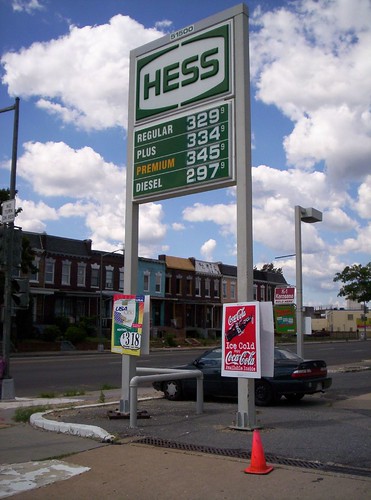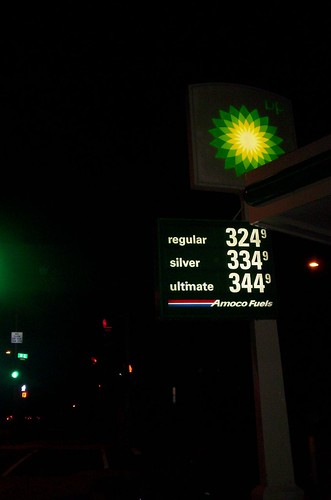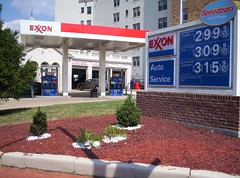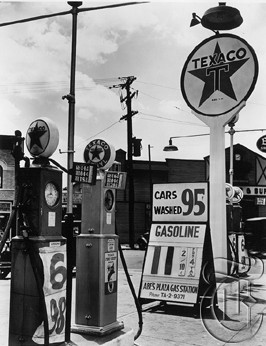Is gasoline the new crack? Proposals to suspend gasoline excise taxes sign of a deep addiction.
 Hess Station, Florida Avenue NE, Sunday, September 4th.
Hess Station, Florida Avenue NE, Sunday, September 4th.Today's themail e-newsletter on local government includes an entry by Keith Jarrell, who suggests that because of rising costs of gasoline, that the DC government suspend the collection of gasoline excise taxes. The moderator added this comment -- On September 1, Governor Sonny Perdue of Georgia ordered that state's gas tax suspended through the month of September, and ordered the state legislature back into session to ratify the suspension.
My response:
Reducing or eliminating gasoline excise taxes is comparable to recent practices of not funding levee improvement in New Orleans. Implementing this idea won't lead to death, as it did in New Orleans, but such a policy would come at great cost to current and future generations.
 800 block of Pennsylvania Avenue SE, at night, September 1st.
800 block of Pennsylvania Avenue SE, at night, September 1st.Although automobile drivers think that they bear the full cost of road building and maintenance they don't--per gallon gasoline taxes cover 35% of the cost of road building, while vehicle taxes and tolls total 24%, leaving 31% of the total cost of road building and maintenance to be borne by local, state, and federal government general funds. (For more information see the syndicated column by Neal Peirce from May 2003 entitled "GAS TAX HIKES: NEEDED BUT POLITICALLY PERILOUS" which is discussed in my blog entry "Gasoline Tax Myths" and a Virginia reader has added a good comment discussing details of Virginia's gasoline tax excise revenue collections.)
Why is your driving so important that other people need to subsidize your choice, right now or any time?
Why doesn't the increasing cost of gasoline, and the acknowledged recognition that oil is a finite and depleting resource, instead foment calls for matching land use and planning policy with transit and other non-automobile-centric transportation patterns?
Given the prominence access to oil supplies plays in U.S. foreign policy, why isn't reducing the country's use of foreign oil the number one foreign and domestic policy issue right now (other than dealing with the catastrophe of Hurricane Katrina)?
 200 block of Massachusetts Avenue NE, September 1st, daytime pricing.
200 block of Massachusetts Avenue NE, September 1st, daytime pricing._________
For more automobile-energy news, see "Oil, natural gas lines return to life in Gulf"; "Fuel costs sway the future" which states:
What goes up (fuel costs) must come down (large truck and SUV sales). Right? This vehicular law of gravity is accepted by many in the automobile industry. But few expect the masses to trade their gas-gulping, three-rows-of-seats road hogs for some elfin car that drinks fuel by the drop.
The garages of multivehicle American families tend to shelter, at minimum, one passenger auto and one utility vehicle. The SUV might be swapped out in the coming months -- but for light trucks or minivans, observers say. Or they might stay the course. "Consumers are going to increasingly weigh the importance of fuel efficiency," said Bob Schnorbus, chief economist for J.D. Power and Associates, a research and consulting firm. "But if they need, in their minds, an SUV, they are going to find a way to stay in that vehicle. They'll still look for big engines, towing capacity, cargo space."
The consensus among analysts of fuel prices is that a gallon will drift back to the mid-$2 range and settle in. Even if it stays north of $3, Schnorbus contends the super-sized vehicles will not go the way of dinosaurs and horse-drawn wagons. "After a couple of fill-ups, as painful as it might be, people will get on with it," he said. "As much as we hate paying those prices, we're not ready to give it up."
and "Supply and demand rule the road, and what drives on it" where Detroit News columnist Daniel Howes writes:
"The we-told-you-sos have it wrong about what Hurricane Katrina-induced $3-a-gallon gas means for Detroit. Sliding sales of big SUVs, gas lines at some stations and fears that prices will go even higher as the oil industry struggles to rebuild refineries and oil platforms in the Gulf of Mexico aren't proof that what the country needs are stiffer federal fuel-economy rules. They're proof that the market forces of supply and demand are the sternest disciplinarian of all."
______
I guess my response would be the fact that market pricing isn't reducing auto-dependency means that in fact, stiffer federal fuel-economy rules are in order. Oil is running out, and is it worth spending hundreds of billions of dollars each year in military and other foreign policy expenditures to maintain access to this resource in areas of the world that are increasingly unfriendly to U.S. economic interests.
You can either reduce oil dependency, or by any means necessary acquire access to more oil. The latter strategy runs into the fact that oil supplies are dwindling. So reducing energy use seems to be of primary importance for national and local policies. Taxes are one way to get people to do what they ought to do, rather than what they want to do.
If high gasoline prices don't reduce demand, and don't reduce demand for big engines and high-weight vehicles, what will?
 Gas Station in Oklahoma. Bereneice Abbott, Museum of the City of New York.
Gas Station in Oklahoma. Bereneice Abbott, Museum of the City of New York.



0 Comments:
Post a Comment
<< Home